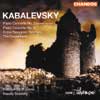Kabalevsky Piano Concertos Nos 2 & 3
Fine playing and recording shows the Russian’s modest talents in the best light
View record and artist detailsRecord and Artist Details
Composer or Director: Dmitry Borisovich Kabalevsky
Genre:
Orchestral
Label: Chandos
Magazine Review Date: 7/2003
Media Format: CD or Download
Media Runtime: 62
Mastering:
Stereo
DDD
Catalogue Number: CHAN10052

Tracks:
| Composition | Artist Credit |
|---|---|
| Colos Breugnon, Movement: Overture |
Dmitry Borisovich Kabalevsky, Composer
BBC Philharmonic Orchestra Dmitry Borisovich Kabalevsky, Composer Vassily Sinaisky, Conductor |
| Concerto for Piano and Orchestra No. 2 |
Dmitry Borisovich Kabalevsky, Composer
BBC Philharmonic Orchestra Dmitry Borisovich Kabalevsky, Composer Kathryn Stott, Piano Vassily Sinaisky, Conductor |
| Concerto for Piano and Orchestra No. 3 |
Dmitry Borisovich Kabalevsky, Composer
BBC Philharmonic Orchestra Dmitry Borisovich Kabalevsky, Composer Kathryn Stott, Piano Vassily Sinaisky, Conductor |
| (The) Comedians |
Dmitry Borisovich Kabalevsky, Composer
BBC Philharmonic Orchestra Dmitry Borisovich Kabalevsky, Composer Vassily Sinaisky, Conductor |
Author: David Fanning
Kabalevsky’s piano concertos present easy targets for critical demolition, such is their ease of assimilation. And uncritical hyperbole is not a helpful corrective; reviewing the listed comparison on Olympia, Bryce Morrison was rightly peeved by the over-sell of the booklet note. Still, that disc, for all the commanding pianism on display, is sonically challenged, and no one, surely, would begrudge Kabalevsky’s modest but genuine talents the fine playing and luxurious recording lavished on them in this new Chandos issue.
In the Second Concerto – a close contemporary of Khachaturian’s sole Piano Concerto from the mid-1930s, but a good deal less inflated – Kathryn Stott takes a far gentler approach than Nikolai Petrov, and the recorded balance sets her in a more realistic perspective. This is all to the good, because it enables her to tease out subtleties of character that the imperious Russian rather glosses over, and it also helps to disguise somewhat Kabalevsky’s huge debt to Prokofiev. Rather than steam-rollering on, Stott allows space for wit and gracious lyricism to register, and where necessary her accompanying textures are mellow and fine-graded.
She brings similar virtues to the Third Concerto, which, however, can hardly help but sound rather small beer by comparison. This ‘Youth’ Concerto is brilliantly designed for aspiring pianists whose fingers are perhaps more highly developed than their musicianship; as Eric Roseberry’s excellent notes remind us, it was actually premièred by the 17-year-old Ashkenazy. Like Shostakovich’s Second Concerto, which it predates by four years, there are some splendid in-jokes, such as the Emperor-style passagework in the finale, followed by a comically inflated ‘big tune’ (at least I hope it wasn’t intended seriously).
The catchy Overture to Colas Breugnon – in an honourable line from Glinka’s Ruslan to Shostakovich’s Festive Overture – opens the disc with a swing, and the two concertos are separated by the pleasantly brainless Suite from The Comedians: high-class light music from the same stable as Shostakovich’s ballet-scores. Kabalevsky was always happy to graze where others had planted. But such is the class of the BBC Philharmonic’s playing for their principal guest conductor that by the end of the disc I felt that I had at least been shown facets of his art that I had never before appreciated.
In the Second Concerto – a close contemporary of Khachaturian’s sole Piano Concerto from the mid-1930s, but a good deal less inflated – Kathryn Stott takes a far gentler approach than Nikolai Petrov, and the recorded balance sets her in a more realistic perspective. This is all to the good, because it enables her to tease out subtleties of character that the imperious Russian rather glosses over, and it also helps to disguise somewhat Kabalevsky’s huge debt to Prokofiev. Rather than steam-rollering on, Stott allows space for wit and gracious lyricism to register, and where necessary her accompanying textures are mellow and fine-graded.
She brings similar virtues to the Third Concerto, which, however, can hardly help but sound rather small beer by comparison. This ‘Youth’ Concerto is brilliantly designed for aspiring pianists whose fingers are perhaps more highly developed than their musicianship; as Eric Roseberry’s excellent notes remind us, it was actually premièred by the 17-year-old Ashkenazy. Like Shostakovich’s Second Concerto, which it predates by four years, there are some splendid in-jokes, such as the Emperor-style passagework in the finale, followed by a comically inflated ‘big tune’ (at least I hope it wasn’t intended seriously).
The catchy Overture to Colas Breugnon – in an honourable line from Glinka’s Ruslan to Shostakovich’s Festive Overture – opens the disc with a swing, and the two concertos are separated by the pleasantly brainless Suite from The Comedians: high-class light music from the same stable as Shostakovich’s ballet-scores. Kabalevsky was always happy to graze where others had planted. But such is the class of the BBC Philharmonic’s playing for their principal guest conductor that by the end of the disc I felt that I had at least been shown facets of his art that I had never before appreciated.
Discover the world's largest classical music catalogue with Presto Music.

Gramophone Digital Club
- Digital Edition
- Digital Archive
- Reviews Database
- Full website access
From £8.75 / month
Subscribe
Gramophone Full Club
- Print Edition
- Digital Edition
- Digital Archive
- Reviews Database
- Full website access
From £11.00 / month
Subscribe
If you are a library, university or other organisation that would be interested in an institutional subscription to Gramophone please click here for further information.




